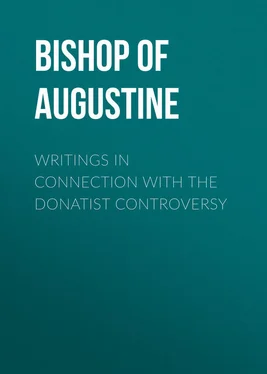Saint Augustine - Writings in Connection with the Donatist Controversy
Здесь есть возможность читать онлайн «Saint Augustine - Writings in Connection with the Donatist Controversy» — ознакомительный отрывок электронной книги совершенно бесплатно, а после прочтения отрывка купить полную версию. В некоторых случаях можно слушать аудио, скачать через торрент в формате fb2 и присутствует краткое содержание. Жанр: foreign_antique, foreign_prose, на английском языке. Описание произведения, (предисловие) а так же отзывы посетителей доступны на портале библиотеки ЛибКат.
- Название:Writings in Connection with the Donatist Controversy
- Автор:
- Жанр:
- Год:неизвестен
- ISBN:нет данных
- Рейтинг книги:3 / 5. Голосов: 1
-
Избранное:Добавить в избранное
- Отзывы:
-
Ваша оценка:
- 60
- 1
- 2
- 3
- 4
- 5
Writings in Connection with the Donatist Controversy: краткое содержание, описание и аннотация
Предлагаем к чтению аннотацию, описание, краткое содержание или предисловие (зависит от того, что написал сам автор книги «Writings in Connection with the Donatist Controversy»). Если вы не нашли необходимую информацию о книге — напишите в комментариях, мы постараемся отыскать её.
Writings in Connection with the Donatist Controversy — читать онлайн ознакомительный отрывок
Ниже представлен текст книги, разбитый по страницам. Система сохранения места последней прочитанной страницы, позволяет с удобством читать онлайн бесплатно книгу «Writings in Connection with the Donatist Controversy», без необходимости каждый раз заново искать на чём Вы остановились. Поставьте закладку, и сможете в любой момент перейти на страницу, на которой закончили чтение.
Интервал:
Закладка:
Chap. xv. – 20. Accordingly, if Marcion consecrated the sacrament of baptism with the words of the gospel, "In the name of the Father, and of the Son, and of the Holy Ghost," 139 139 Matt. xxviii. 19.
the sacrament was complete, although his faith expressed under the same words, seeing that he held opinions not taught by the Catholic truth, was not complete, but stained with the falsity of fables. 140 140 Cp. Concilium Arelatense , can. 8. "De Afris, quod propria lege utuntur ut rebaptizent; placuit ut si ad ecclesiam aliquis de hæresi venerit, interrogent eum symbolum; et si perviderint eum in Patre, et Filio, et Spiritu sancto esse baptizatum, manus ei tantum imponatur, ut accipiat Spiritum sanctum. Quod si interrogatus non responderit hanc Trinitatem, baptizetur."
For under these same words, "In the name of the Father, and of the Son, and of the Holy Ghost," not Marcion only, or Valentinus, or Arius, or Eunomius, but the carnal babes of the Church themselves (to whom the apostle said, "I could not speak unto you as unto spiritual, but as unto carnal"), if they could be individually asked for an accurate exposition of their opinions, would probably show a diversity of opinions as numerous as the persons who held them, "for the natural man receiveth not the things of the Spirit of God." Can it, however, be said on this account that they do not receive the complete sacrament? or that, if they shall advance, and correct the vanity of their carnal opinions, they must seek again what they had received? Each man receives after the fashion of his own faith; yet how much does he obtain under the guidance of that mercy of God, in the confident assurance of which the same apostle says, "If in anything ye be otherwise minded, God shall reveal even this to you?" 141 141 Phil. iii. 15.
Yet the snares of heretics and schismatics prove for this reason only too pernicious to the carnally-minded, because their very progress is intercepted when their vain opinions are confirmed in opposition to the Catholic truth, and the perversity of their dissension is strengthened against the Catholic peace. Yet if the sacraments are the same, they are everywhere complete, even when they are wrongly understood, and perverted to be instruments of discord, just as the very writings of the gospel, if they are only the same, are everywhere complete, even though quoted with a boundless variety of false opinions. For as to what Jeremiah says – "Why do those who grieve me prevail against me? My wound is stubborn, whence shall I be healed? In its origin it became unto me as lying water, having no certainty," 142 142 Jer. xv. 18, quoted from the LXX.
– if the term "water" were never used figuratively and in the allegorical language of prophecy except to signify baptism, we should have trouble in discovering what these words of Jeremiah meant; but as it is, when "waters" are expressly used in the Apocalypse 143 143 Rev. xvii. 15.
to signify "peoples," I do not see why, by "lying water having no certainty," I should not understand, "a lying people, whom I cannot trust."
Chap. xvi. – 21. But when it is said that "the Holy Spirit is given only in the Catholic Church," I suppose that our ancestors meant that we should understand thereby what the apostle says, "Because the love of God is spread abroad in our hearts by the Holy Ghost which is given unto us." 144 144 Rom. v. 5.
For this is that very love which is wanting in all who are cut off from the communion of the Catholic Church; and for lack of this, "though they speak with the tongues of men and of angels, though they understand all mysteries and all knowledge, and though they have the gift of prophecy, and all faith, so that they could remove mountains, and though they bestow all their goods to feed the poor, and though they give their bodies to be burned, it profiteth them nothing." 145 145 1 Cor. xiii. 1-3.
But those are wanting in God's love who do not care for the unity of the Church; and consequently we are right in understanding that the Holy Spirit may be said not to be received except in the Catholic Church. For the Holy Spirit is not only given by the laying on of hands amid the testimony of temporal sensible miracles, as He was given in former days to be the credentials of a rudimentary faith, and for the extension of the first beginnings of the Church. For who expects in these days that those on whom hands are laid that they may receive the Holy Spirit should forthwith begin to speak with tongues? but it is understood that invisibly and imperceptibly, on account of the bond of peace, divine love is breathed into their hearts, so that they may be able to say, "Because the love of God is spread abroad in our hearts by the Holy Ghost which is given unto us." But there are many operations of the Holy Spirit, which the same apostle commemorates in a certain passage at such length as he thinks sufficient, and then concludes: "But all these worketh that one and the selfsame Spirit, dividing to every man severally as He will." 146 146 1 Cor. xii. 11.
Since, then, the sacrament is one thing, which even Simon Magus could have; 147 147 Acts viii. 13.
and the operation of the Spirit is another thing, which is even often found in wicked men, as Saul had the gift of prophecy; 148 148 1 Sam. x. 6, 10.
and that operation of the same Spirit is a third thing, which only the good can have, as "the end of the commandment is charity out of a pure heart, and of a good conscience, and of faith unfeigned:" 149 149 1 Tim. i. 5.
whatever, therefore, may be received by heretics and schismatics, the charity which covereth the multitude of sins is the especial gift of Catholic unity and peace; nor is it found in all that are within that bond, since not all that are within it are of it, as we shall see in the proper place. At any rate, outside the bond that love cannot exist, without which all the other requisites, even if they can be recognised and approved, cannot profit or release from sin. But the laying on of hands in reconciliation to the Church is not, like baptism, incapable of repetition; for what is it more than a prayer offered over a man? 150 150 He refers to laying on of hands such as he mentions below, Book v. c. xxiii.: "If hands were not laid on one who returned from heresy, he would be judged to be free from all fault."
Chap. xvii. – 22. "For as regards the fact that to preserve the figure of unity the Lord gave the power to Peter that whatsoever he should loose on earth should be loosed," 151 151 Matt. xvi. 19.
it is clear that that unity is also described as one dove without fault. 152 152 Song of Sol. vi. 9.
Can it be said, then, that to this same dove belong all those greedy ones, whose existence in the same Catholic Church Cyprian himself so grievously bewailed? For birds of prey, I believe, cannot be called doves, but rather hawks. How then did they baptize those who used to plunder estates by treacherous deceit, and increase their profits by compound usury, 153 153 Cypr. de Lapsis , c. 4.
if baptism is only given by that indivisible and chaste and perfect dove, that unity which can only be understood as existing among the good? Is it possible that, by the prayers of the saints who are spiritual within the Church, as though by the frequent lamentations of the dove, a great sacrament is dispensed, with a secret administration of the mercy of God, so that their sins also are loosed who are baptized, not by the dove but by the hawk, if they come to that sacrament in the peace of Catholic unity? But if this be so, why should it not also be the case that, as each man comes from heresy or schism to the Catholic peace, his sins should be loosed through their prayers? But the integrity of the sacrament is everywhere recognised, though it will not avail for the irrevocable remission of sins outside the unity of the Church. Nor will the prayers of the saints, or, in other words, the groanings of that one dove, be able to help one who is set in heresy or schism; just as they are not able to help one who is placed within the Church, if by a wicked life he himself retain the debts of his sins against himself, and that though he be baptized, not by this hawk, but by the pious ministry of the dove herself.
Интервал:
Закладка:
Похожие книги на «Writings in Connection with the Donatist Controversy»
Представляем Вашему вниманию похожие книги на «Writings in Connection with the Donatist Controversy» списком для выбора. Мы отобрали схожую по названию и смыслу литературу в надежде предоставить читателям больше вариантов отыскать новые, интересные, ещё непрочитанные произведения.
Обсуждение, отзывы о книге «Writings in Connection with the Donatist Controversy» и просто собственные мнения читателей. Оставьте ваши комментарии, напишите, что Вы думаете о произведении, его смысле или главных героях. Укажите что конкретно понравилось, а что нет, и почему Вы так считаете.












